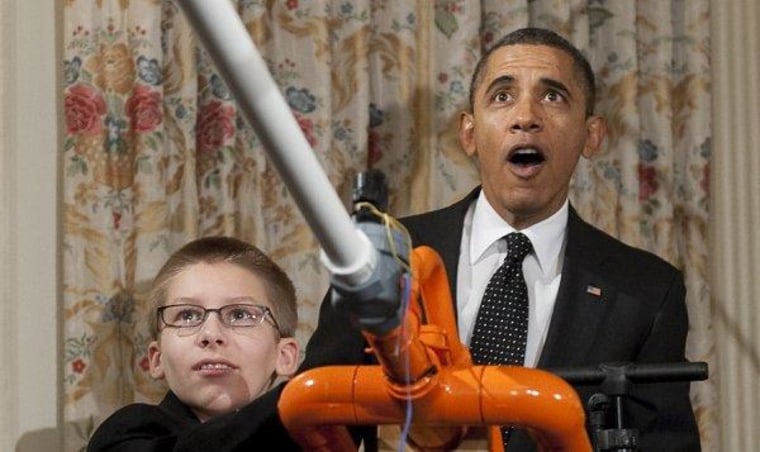Sen. Marco Rubio (R-Fla.) raised a few eyebrows this week when he struggled with a fairly straightforward question: "How old do you think the Earth is?" The Republican responded, "I'm not a scientist, man," before immediately shifting to a theological discussion, and concluding that the age of the planet may simply be unknowable. "It's one of the great mysteries," Rubio said.
With this in mind, Slate's Daniel Engber wrote a piece conservatives seem excited about, arguing that "willful ignorance of science is a bipartisan value." Why? Because of a 2008 quote Engber found of then-candidate Barack Obama, speaking at a faith-based forum at a Christian college in Pennsylvania.
Q: Senator, if one of your daughters asked you -- and maybe they already have -- 'Daddy, did god really create the world in 6 days?,' what would you say?A: What I've said to them is that I believe that God created the universe and that the six days in the Bible may not be six days as we understand it ... it may not be 24-hour days, and that's what I believe. I know there's always a debate between those who read the Bible literally and those who don't, and I think it's a legitimate debate within the Christian community of which I'm a part. My belief is that the story that the Bible tells about God creating this magnificent Earth on which we live -- that is essentially true, that is fundamentally true. Now, whether it happened exactly as we might understand it reading the text of the Bible: That, I don't presume to know.
The right is worked up because they, like Engber, see Obama's response as roughly the same as Rubio's. The closer one looks, however, the less sense I think the comparison makes.
Rubio was asked a scientific question in a secular setting, offered an ambiguous response as to whether he believes the planet is billions or thousands of years old, and suggested an objective, scientific truth may be unknowable, though reality shows otherwise.
On the other hand, Obama was asked a theological question in a religious setting, offered a response that rejected young-earth pseudo-science, and suggested spiritual, philosophical truths may be unknowable.
To overlook the qualitative differences is to ignore every relevant detail.
But there's a larger truth that the Slate piece ignores: Obama has celebrated science in ways no modern president has, making the comparison not just mistaken, but ultimately misguided.
Indeed, a few months after his inauguration, Obama was showing so much passion for science that one observer characterized him as "almost strident" on the issue. The description put a negative spin on what I consider to be one of the president's more endearing qualities -- I can't think of a modern president who speaks as often and as enthusiastically about science as Obama. Even his inaugural address vowed, "We will restore science to its rightful place."
Soon after, when Obama reversed Bush-era restrictions on stem-cell research, he issued a memorandum addressing scientific integrity itself.
"Promoting science isn't just about providing resources, it is also about protecting free and open inquiry," Obama said. "It is about letting scientists like those here today do their jobs, free from manipulation or coercion, and listening to what they tell us, even when it's inconvenient especially when it's inconvenient. It is about ensuring that scientific data is never distorted or concealed to serve a political agenda and that we make scientific decisions based on facts, not ideology."He said his memorandum is meant to restore "scientific integrity to government decision-making." He called it the beginning of a process of ensuring his administration bases its decision on sound science; appoints scientific advisers based on their credentials, not their politics; and is honest about the science behind its decisions.
And soon after that, the president announced that, from now on, there will be an annual White House Science Fair. Obama explained at the time, "If you win the NCAA championship, you come to the White House. Well, if you're a young person and you've produced the best experiment or design, the best hardware or software, you ought to be recognized for that achievement, too. Scientists and engineers ought to stand side by side with athletes and entertainers as role models, and here at the White House we're going to lead by example. We're going to show young people how cool science can be."
To suggest this president is Rubio-esque on matters of science is to fail to pay close enough attention.
Yes, I'll gladly concede that when asked a theological question at a Christian college about the story of Genesis, Obama rejected Biblical literalism, but said he won't "presume" to know the answers to some philosophical questions. But to see this as comparable to "I'm not a scientist, man" is to be willfully confused.
